 Petzlover
Petzlover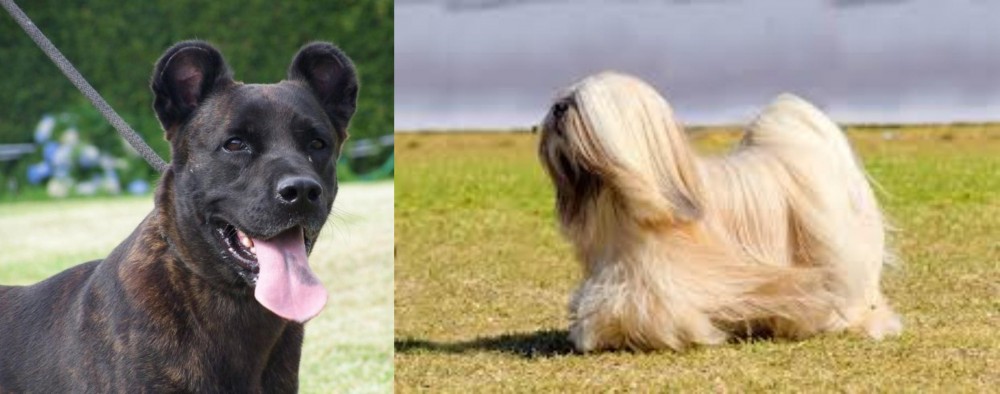 Cao Fila de Sao Miguel is originated from Portugal but Lhasa Apso is originated from China. Cao Fila de Sao Miguel may grow 33 cm / 13 inches higher than Lhasa Apso. Cao Fila de Sao Miguel may weigh 33 kg / 73 pounds more than Lhasa Apso. Both Cao Fila de Sao Miguel and Lhasa Apso has almost same life span. Cao Fila de Sao Miguel may have more litter size than Lhasa Apso. Cao Fila de Sao Miguel requires Low Maintenance. But Lhasa Apso requires Moderate Maintenance
Cao Fila de Sao Miguel is originated from Portugal but Lhasa Apso is originated from China. Cao Fila de Sao Miguel may grow 33 cm / 13 inches higher than Lhasa Apso. Cao Fila de Sao Miguel may weigh 33 kg / 73 pounds more than Lhasa Apso. Both Cao Fila de Sao Miguel and Lhasa Apso has almost same life span. Cao Fila de Sao Miguel may have more litter size than Lhasa Apso. Cao Fila de Sao Miguel requires Low Maintenance. But Lhasa Apso requires Moderate Maintenance
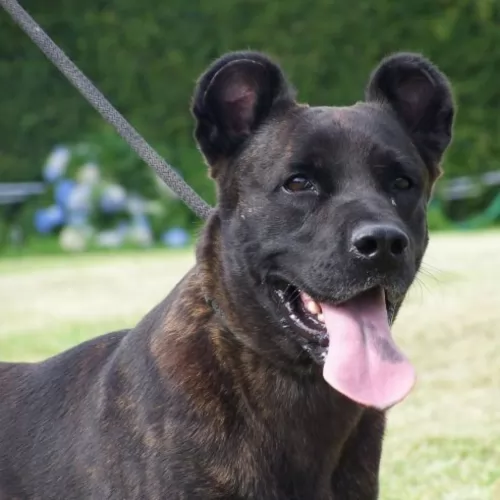 This Molosser type dog originated on Sao Miguel Island in the Azores, a region of Portugal. Known also as the Sao Miguel Cattle Dog or the Azores Cattle Dog, the existence of the Cao Fila de Sao Miguel has been documented since early in the 19th century.
This Molosser type dog originated on Sao Miguel Island in the Azores, a region of Portugal. Known also as the Sao Miguel Cattle Dog or the Azores Cattle Dog, the existence of the Cao Fila de Sao Miguel has been documented since early in the 19th century.
The dog has always been used as a cattle dog but today it remains rare outside of Portugal. In was in 1984 in Portugal that the first written breed standard was published in Portugal. The Cao Fila de Sao Miguel then earned recognition with the Portuguese Kennel Club.
 The Lhasa Apso is a non-sporting dog hailing from Tibet. He was a useful dog to the monks who would use him in the palaces as well as the monasteries to ward off intruders.
The Lhasa Apso is a non-sporting dog hailing from Tibet. He was a useful dog to the monks who would use him in the palaces as well as the monasteries to ward off intruders.
He actually takes his name from the holy city of Lhasa, with the history of the breed going back to 600BC.
Today he is a true companion dog, a family dog, known as as the Tibetan Apso, the Bearded Lion Dog, the Apso and Lhasa.
The dog has been recognized by the American Kennel Club in 1935, in the Non-Sporting Group category.
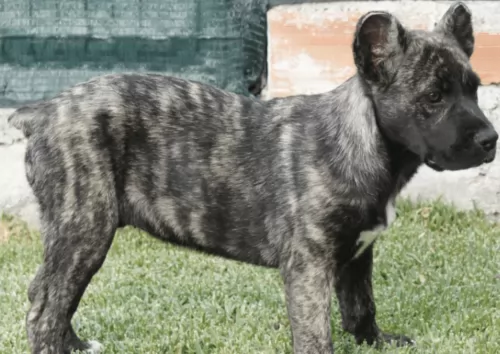 The Cao Fila de Sao Miguel is a medium to large sized dog standing 50 – 61cm in height and weighing 25 – 41kg. As with all molossers, the dog has powerful jaws.
The Cao Fila de Sao Miguel is a medium to large sized dog standing 50 – 61cm in height and weighing 25 – 41kg. As with all molossers, the dog has powerful jaws.
This dog breed has muscular limbs and dark brown eyes. The ears are normally docked into a rounded shape much like that of the Hyena. The tail has always been docked at the 2nd or 3rd vertebra but these days with regulations surrounding docking, the tail is unfortunately left long.
The coat of the Cao Fila de Sao Miguel is short and smooth while the hair on the tail and thighs is a bit longer. The Cao Fila de Sao Miguel is always brindled, and comes in shades of fawn, brown, gray or black. A white mark on the forehead around the chest or on the paws is also often seen.
The Cão de Fãila de São Miguel is a working dog who is used to guarding livestock. He is an athletic dog, game for plenty of action, and he will require plenty of daily exercise. He is territorial and makes an excellent guard dog, but even so, when it comes to his own owner and human family, he is gentle and loving.
The Cao de Fila de Sao Miguel is an intelligent dog and he will need training and socialization which allows him to get on well with children in the home as well as other pets.
 Lhasa Apsos are small dogs which stand at between 25 to 28cm in height and weigh in the region of 6 to 8kg.
Lhasa Apsos are small dogs which stand at between 25 to 28cm in height and weigh in the region of 6 to 8kg.
The body length of the dog is longer than the height of the dog. He has brown eyes, a black nose and medium length, floppy ears. The long tail is carried over the dog's back.
Many people get used to seeing a sheared or clipped Lhaso, so when they see a dog where the coat has been left uncut they can’t believe the long, straight, dense coat.
Because the dog hails from Tibet where the weather can be extremely cold, he has a double coat – an under- and outer coat. While the coat looks fairly silky, it isn’t really and is in fact quite course to the touch.
Colors of the coat can be gold, tan, cream, white, black and white. Regular brushing will be needed for the coat because this is a dog with continual shedding. These dogs are regarded as being hypoallergenic as they hardly shed.
Looks can be quite deceiving when it comes to the Lhasa Apso as he is a dog who looks as though butter wouldn’t melt in his mouth and that he is essentially just a cuddly lapdog.
This small little dog is tough, robust, strong-willed and in his heart he believes he is a huge Tiger.
He’ll make his human family a loyal and loving pet but he is wary with strangers, distrusting anyone he meets for the first time. He is a dog that will need to be trained and socialized as he may take over your home in his ‘Tiger’ role.
Smart and dominant, this training will turn him into an obedient dog to have around which is important as he can become bossy if left to go his own way.
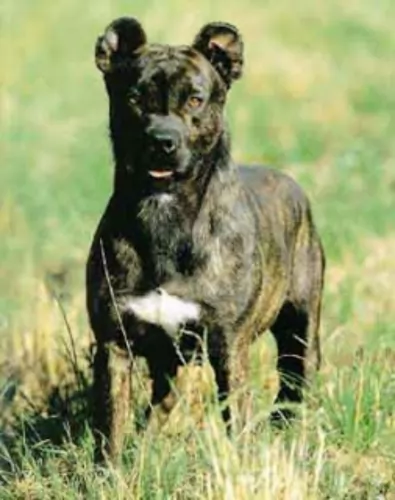 The Cão de Fila de São Miguel is a natural guard dog who will love and guard his family. With training and socialization he can become a devoted and gentle family dog with children and with other pets. They can be aloof with strangers.
The Cão de Fila de São Miguel is a natural guard dog who will love and guard his family. With training and socialization he can become a devoted and gentle family dog with children and with other pets. They can be aloof with strangers.
The Cão de Fila de São Miguel is an active dog who wants to be busy, and he is therefore better suited to country living rather that in a small home where space is limited.
Intelligent, a fast learner, protective and territorial, the Cão de Fila de Sao Miguel is an aggressive, hardy working breed who is also an excellent guard dog and protector. With firm training he becomes loyal, lovable and devoted – an ideal family companion.
 The Lhasa Apso is a small dog full of surprises. That's because he can be manipulative, naughty and feisty one minute, and sweet and gentle the next. He happens to be a good watch dog too, and will alert you well in advance to intruders.
The Lhasa Apso is a small dog full of surprises. That's because he can be manipulative, naughty and feisty one minute, and sweet and gentle the next. He happens to be a good watch dog too, and will alert you well in advance to intruders.
Because he is small and not a particularly energetic dog, he can slot into life in the city or the countryside with ease. However, exercise is good and necessary for every dog so be sure he joins you on your daily walks or you give him some games indoors.
The Lhasa can be a wonderful family companion and you’ll find that he can get on well with children who have been taught to treat animals with kindness and respect. He isn’t the kind of dog that you keep outdoors but is essentially an indoor dog, relishing the time he spends with his beloved human family and making a wonderful companion.
 The Cao Fila de Sao Miguel is a dog who enjoys exceptional health. When you do research you see there aren’t really any particular illnesses plaguing this dog, and he can actually live to be 15 years of age. Be aware of some illnesses as they are common among different dog breeds – hip- and elbow dysplasia, bloat, eye diseases such as progressive retinal atrophy and cataracts, heat intolerance and arthritis.
The Cao Fila de Sao Miguel is a dog who enjoys exceptional health. When you do research you see there aren’t really any particular illnesses plaguing this dog, and he can actually live to be 15 years of age. Be aware of some illnesses as they are common among different dog breeds – hip- and elbow dysplasia, bloat, eye diseases such as progressive retinal atrophy and cataracts, heat intolerance and arthritis.
This is a dangerous illness that can affect any dog – small or large. This is when the dog’s stomach fills with fluid or gas so that it expands. The stomach then puts pressure on other organs and your dog can have trouble breathing. There is also no blood flow to the heart. Sometimes the stomach of the dog twists and your pet can go into a state of shock. Recognize the symptoms of bloat – a swollen stomach, drooling and wanting to vomit but nothing coming up. Get your dog to the vet immediately.
An abscess can be so painful for your pet often when your dog has a thick coat it could go undetected. If an abscess on your pet doesn’t burst, or even if another abscess appears, a vet must be consulted and a course of antibiotics given.
Ear mites, dirt and a build up of wax may cause your dog to scratch at the ear, shake his head or hold it on one side. There may even be a foul-smelling discharge. Your dog will need to have his ears cleaned. Special ear drops can rectify the problem. Remember that hot, red ears will require veterinary attention.
 Every dog can develop genetic health problems, but it is highly unlikely that with good care, your Lhasa Apso is going to get sick.
Every dog can develop genetic health problems, but it is highly unlikely that with good care, your Lhasa Apso is going to get sick.
He’s a healthy dog breed that can get to 14 years of age and even older. With Lhasas, health problems can include things like hip dysplasia, eye problems and intervertebral disc disease.
If you are buying a puppy, be careful from where you buy him from. You want careful breeders who screen their parent dogs for genetic diseases. Keeping your dog at the right weight and preventing obesity will also help to ensure he remains healthy.
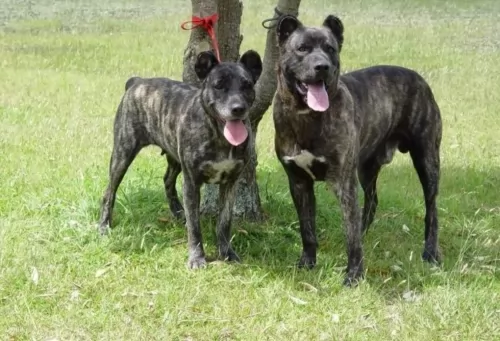 The Cao Fila de Sao Miguel is a low maintenance breed and all that will be required for him is that you give him a thorough brushing a couple of times a week.
The Cao Fila de Sao Miguel is a low maintenance breed and all that will be required for him is that you give him a thorough brushing a couple of times a week.
The Cao Fila De Sao Miguel puppy will require four meals of puppy food a day. The adult Cao fila de sao miguel can go down to 1 or 2 meals a day after his 1st birthday.
These days you get some excellent commercially manufactured dog foods and your veterinarian can help you choose one suited to this particular dog breed. Add in some home-made vegetables, rice and meat every now and then. The idea is to make sure your dog is getting in all the minerals and vitamins he needs.
There is evidence showing that dogs who enjoy raw meat every now and then enjoy a number of health benefits. Skin and teeth are improved, your dog has a shinier coat, less allergies,less inflammation and he is more relaxed and amicable. Ensure a constant supply of fresh, cool water in a clean bowl and at all times.
 The Lhasa Apso is going to require regular brushing of his coat as it can get long and then it will matt and tangle easily.
The Lhasa Apso is going to require regular brushing of his coat as it can get long and then it will matt and tangle easily.
There are owners of this dog breed who prefer to send their dog to their grooming parlor where the coat is trimmed short the way they prefer, minimizing the time spent grooming the dog. At the grooming parlour they also check the ears, the teeth of the dog and the nails, particularly if they don’t wear down naturally.
The Lhasa was bred to be a watchdog, so even though he is a small dog, he does his best to guard and protect you. He is no pushover, and training him and socializing him makes him even more adorable to be around.
As man’s best friend, he needs a high-quality, nutritious diet because this helps to protect him from disease. You can feed him the best commercially manufactured foods, but study the packaging details on what the ingredients are. You want to be avoiding corn and wheat, colorants and preservatives.
Your Lhasa has 4 – 6 puppies and as these get older and are weaned they will require 4 meals a day. Once your dog reaches one year of age, he can have 2 meals a day instead of one larger meal.
Every dog loves a little bit of home-made food as a treat, and your Lhasa will wag his tail when you add in some cooked chicken, brown rice and some raw or cooked vegetables into his kibble. Include some raw meat in the diet occasionally as well as this helps to avoid dog skin problems.
Folliculitis is a skin disease starting in the hair follicles of the dog and often occurs in conjunction with other skin disorders like mange. It is found mostly on the dog's abdomen, his armpits and groin and you’ll notice scaly rings with pus and scabs.
To avoid nasty skin diseases which can be very distressing for your pet, remember that your dog's dietary intake plays a huge role in the maintenance of a healthy skin and some raw meat is key to his wellbeing.